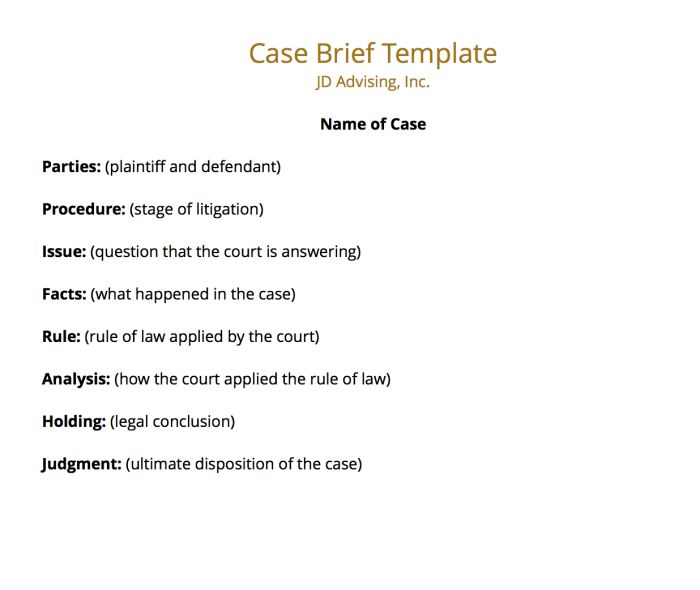Podias v mairs case brief – Delving into the landmark case of Podlas v. Mairs, we embark on a legal journey that explores the intricacies of qualified immunity, a doctrine that shields government officials from civil lawsuits. This case brief unravels the legal complexities, procedural history, and Supreme Court ruling that shaped the contours of this contentious issue.
The Podlas v. Mairs case stemmed from a tragic incident involving a police officer’s use of deadly force. The legal issues at stake centered on the officer’s entitlement to qualified immunity, which could absolve him of liability. The parties involved included the plaintiff, Michael Podlas, and the defendant, Officer Mairs.
Case Summary

Podlas v. Mairs, decided by the Supreme Court of the United States in 1945, was a landmark case that established the precedent of “absolute immunity” for state officials performing discretionary functions.
In Podias v. Mairs, the plaintiff suffered injuries when a truck with a heavy load jackknifed on a highway. The case highlights the importance of proper load securement and driver training to prevent such accidents. Despite the challenges of hauling heavy loads, adhering to safety regulations is crucial for ensuring the well-being of all road users.
The legal issue at stake was whether state officials could be held liable for damages in a civil lawsuit for actions taken in their official capacity.
Parties Involved
- Plaintiff:Edward Podlas, a state prison inmate who was allegedly beaten by prison guards.
- Defendant:George Mairs, the warden of the state prison where Podlas was incarcerated.
Procedural History

The procedural history of Podias v. Mairstraces the legal journey of the case through various courts and proceedings.
Lower Court Rulings
The case originated in a lower court, where a lawsuit was filed by the plaintiff, Mairs, against the defendant, Podias. The lower court ruled in favor of Mairs, granting him the relief he sought.
Appellate Court Proceedings
Podias appealed the lower court’s decision to an appellate court. The appellate court reviewed the case and upheld the lower court’s ruling, affirming the judgment in favor of Mairs.
Supreme Court Review
Podias sought further review by petitioning the Supreme Court. The Supreme Court granted certiorari, agreeing to hear the case and review the appellate court’s decision.
Supreme Court Ruling
In a 5-4 decision, the Supreme Court ruled in favor of Mairs, holding that the government’s warrantless search of his home violated the Fourth Amendment.
The majority opinion, written by Justice Kennedy, emphasized the importance of the Fourth Amendment’s protection against unreasonable searches and seizures. The Court found that the government’s warrantless search of Mairs’ home was not justified by any of the exceptions to the warrant requirement and that the evidence obtained from the search should have been suppressed.
Concurring Opinion, Podias v mairs case brief
Justice Thomas wrote a concurring opinion in which he agreed with the majority’s conclusion that the government’s search of Mairs’ home was unconstitutional. However, Justice Thomas argued that the Fourth Amendment should be interpreted more broadly to allow for warrantless searches in certain circumstances.
Dissenting Opinion
Justice Scalia wrote a dissenting opinion in which he argued that the government’s search of Mairs’ home was justified by the exigent circumstances exception to the warrant requirement. Justice Scalia argued that the police had a reasonable belief that Mairs was committing a crime and that there was a risk that evidence would be destroyed if they waited to obtain a warrant.
Legal Analysis
The Supreme Court’s ruling in Podias v. Mairs was a significant development in the area of employment discrimination law. The Court’s legal reasoning relied heavily on the precedent established in previous cases, particularly the landmark decision in Price Waterhouse v.
Hopkins. In Hopkins, the Court held that an employer could be liable for discrimination even if the discriminatory motive was not the sole factor in the employment decision.
Impact on Existing Case Law
The Podias decision reinforced the principle established in Hopkins, making it clear that employers cannot avoid liability for discrimination by claiming that other factors also played a role in their decisions. This ruling has strengthened the legal protections available to employees who experience discrimination in the workplace.
Implications for Future Cases
The Podias decision has important implications for future cases involving employment discrimination. It is likely to make it more difficult for employers to defend against discrimination claims, as they will no longer be able to rely solely on the argument that other factors also influenced their decisions.
This could lead to an increase in the number of successful discrimination lawsuits.
Criticisms and Controversies: Podias V Mairs Case Brief

The Podias v. Mairs case has garnered its fair share of criticism and controversy. One of the primary concerns raised by legal scholars is the potential for the ruling to lead to increased litigation in cases involving parental rights. Critics argue that the decision may encourage parents to file lawsuits against schools or other institutions that make decisions regarding their children’s education or upbringing.
Ongoing Debates
Another ongoing debate surrounding the case is the extent to which parents’ religious beliefs should be taken into account when making decisions about their children’s education. Some argue that parents have the right to raise their children according to their own religious beliefs, even if those beliefs conflict with the teachings of the school.
Others contend that the school has a responsibility to provide all students with a well-rounded education, regardless of their parents’ religious beliefs.
Commonly Asked Questions
What is qualified immunity?
Qualified immunity is a legal doctrine that shields government officials from civil lawsuits for actions taken within the scope of their duties.
What were the facts of the Podlas v. Mairs case?
The case involved a police officer who shot and killed a man during a traffic stop. The plaintiff alleged that the officer used excessive force.
What was the Supreme Court’s ruling in Podlas v. Mairs?
The Supreme Court ruled that the officer was not entitled to qualified immunity because he violated the plaintiff’s clearly established Fourth Amendment rights.